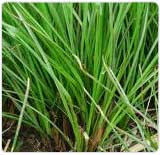 Ask for Price  Ask for Price |
Vetivera Zizanoides is a perennial aromatic grass that grows up to 2 meter in height. The leaves are narrow, linear, erect; spikelets grey in a panicle of numerous racemes, fruits oblong grains. Vetiver oil is steam distilled from Vetiveria zizanoides roots. The oil is amber brown in colour. The odor is sweet, woody, earthy, amber, and balsam. The main chemical components of Vetiver oil are benzoic acid, vetiverol, furfurol, a and b-vetivone, vetivene and vetivenyl vetivenate.
Vetiver oil is used to treat acne, allergies, arthritis, bruises, cuts, itching, menstrual problems, muscular aches and pains, nervous tension, rheumatism, scars, sprains, stiffness, wounds, bug irritations, heatstroke, fevers and headache, inflammatory disorders of the joints and skin, and helps normalize oily, irritated and inflamed skin, is used to reduce wrinkles and stretch marks while nourishing and moisturizing the skin, for eczema, provides stimulation to the endocrine glands (in cases of estrogen and progesterone insufficiency associated with premenstrual syndrome as well as menopause) and circulatory system, and supports a weakened immune system. Vetiver Oil has been noted to have an effect on lowering rapid heart rate and breathing, helping return the cardiorespiratory system to a calmer state. It revitalizes the body and helps with mental and physical exhaustion, it helps in insomnia, balances the activity of the sebaceous oil glands, has deodorizing properties, strengthens the central nervous system, it used for lumbago, is a relieving embrocation, for inflammation and irritability of the stomach, and has a balancing effect on the hormonal system.
It is used as a tonic, for calming over-excitation, stress, tension, is useful to dispel irritability, anger and hysteria, for anxiety, depression, it soothes the mind, used for neurotic behaviour, it nourishes, calms and uplifts, used for emotional grounding and stabilizing the emotions, is considered relaxing to an overheated, hyperactive mind, is used for diffusion and massage. It is also used for insect bites and stings. And used for aromatherapy. It is a popular ingredient for soaps, toiletries, perfumes, after-shave lotions, air freshners, flavoring syrups, ice cream, cool drinks, and for reducing pungency of chewing tobacco preparations, providing sweet note to other masticatories and incense sticks, used for bathing purposes, for cosmetic and food preservation.
The therapeutic properties of vetiver oil are antiseptic, aphrodisiac, cicatrisant, nervine, sedative, tonic, sedative, vulnerary, analgesic, antibacterial, antifungal, anti-inflammatory, antimicrobial, antioxidant, antispasmodic, cell proliferant, depurative, emmenagogue, rubefacient, stimulant, vermifuge, vulnerary. Vetiver oil blends well with Bergamot, Black pepper, Cedarwood, Clary sage, Geranium, Ginger, Grapefruit, Jasmine, Lavender, Lemon, Lemongrass, Litsea Cubeba, Mandarin, Oakmoss, Opopanax, Orange, Patchouli, Rose, Sandalwood and Ylang Ylang oils.
Specifications of Indian Vetiver Oil
| Test | Results |
| Appearance | Light yellow to reddish brown |
| Odour | Woody herbaceous, spicy, almost smoky |
| Specific Gravity at 25°C/25°C | 0.978 - 1.033 |
| Refractive Index at 25°C | 1.513 - 1.528 |
| Acid value | 48.1 mg KOH/G |
| Ester Number | 5 - 25 |
| Total Alcohols | 43.5% (Approx) |
| Solubility | Solubility in 95% Ethanol: Soluble in 1:1 (v/v) dilution |
| Storage | Store in a cool, dry place in tightly sealed containers, protected from heat and light |

